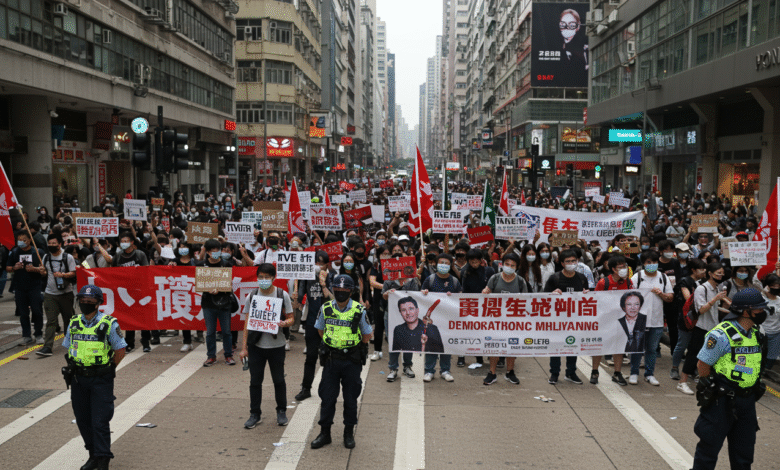With a Distracted U.S., Hong Kong Intensifies Its Democratic Crackdown

Introduction
In recent years, Hong Kong has witnessed a significant erosion of its democratic freedoms. This decline has been notably accelerated since the imposition of the National Security Law (NSL) in 2020, which granted Beijing sweeping powers to suppress dissent and curtail civil liberties. While the international community has expressed concern, the response, particularly from the United States, has been inconsistent and often overshadowed by domestic priorities. This article delves into the multifaceted crackdown on democracy in Hong Kong and examines the role of a distracted U.S. in enabling this authoritarian shift.You know about theglobespot, andaazdaily, openrendz and hong kong democratic crackdown also Buzzfeed.
The National Security Law: A Tool for Suppression
The NSL was introduced by Beijing to combat what it termed “secession, subversion, terrorism, and foreign interference.” However, critics argue that the law has been wielded to stifle political opposition, suppress free speech, and dismantle the pro-democracy movement in Hong Kong. Under the guise of national security, authorities have arrested activists, journalists, and politicians, leading to a chilling effect on public discourse.
Impact on Political Activism
Prominent pro-democracy figures have been targeted under the NSL. For instance, in 2021, 55 opposition figures were arrested for participating in an unofficial primary election, accused of subversion. This mass detention signaled a broader strategy to eliminate political opposition and deter future activism.
Suppression of Civil Society
Civil society organizations have not been spared. The Hong Kong Confederation of Trade Unions, a significant labor rights group, disbanded in 2022 due to mounting pressure and legal threats. Similarly, the Hong Kong Professional Teachers’ Union, once the city’s largest teachers’ group, was forced to shut down, citing fears of prosecution under the NSL.
Media Freedom in Decline
Media outlets critical of the government have faced increasing scrutiny and closure. The iconic pro-democracy newspaper Apple Daily was shut down in 2021 after its founder, Jimmy Lai, was arrested under the NSL. Other outlets, such as Stand News and Citizen News, have also ceased operations, leading to a significant contraction in press freedom.
International Media Exits
International media organizations have also been affected. The BBC and Reuters have scaled back their operations in Hong Kong, citing concerns over the safety of their journalists and the restrictive media environment. This exodus has further isolated Hong Kong from global scrutiny.
The Role of the United States: A Distracted Superpower
Historically, the U.S. has been a vocal advocate for democracy and human rights in Hong Kong. However, recent years have seen a shift in priorities, with domestic issues and geopolitical tensions taking precedence.
Inconsistent Policy Responses
While the U.S. has imposed sanctions on Chinese and Hong Kong officials implicated in human rights abuses, these measures have been sporadic and often lack follow-through. The Trump administration’s “America First” policy has led to a reduced emphasis on international human rights advocacy, including in Hong Kong.
Limited Diplomatic Engagement
Diplomatic efforts to address the situation in Hong Kong have been limited. High-level engagements have been rare, and when they occur, they often lack concrete outcomes. This lack of sustained diplomatic pressure has emboldened Beijing and allowed the crackdown to intensify.
The Economic Dimension: A Dual-Edged Sword
Hong Kong’s status as a global financial hub has been challenged by the political crackdown. While some businesses have left due to the deteriorating environment, others have capitalized on the situation.
Capital Flight
Many multinational corporations have relocated their regional headquarters from Hong Kong to other Asian cities, such as Singapore, in response to the increasing political risks. This exodus reflects concerns over the erosion of the rule of law and the potential for arbitrary legal actions under the NSL.
Economic Opportunism
Conversely, some businesses have adapted to the new political landscape by aligning themselves with the government. These entities often benefit from favorable policies and increased access to mainland markets, highlighting the complex interplay between politics and economics in the region.
International Reactions: Condemnation Without Action
The international community has largely condemned Hong Kong’s democratic crackdown, but actions have been limited.
United Nations and European Union
The United Nations has expressed concern over the human rights situation in Hong Kong, urging China to uphold its international obligations. Similarly, the European Union has issued statements criticizing the erosion of freedoms but has stopped short of implementing significant sanctions.
Regional Responses
Neighboring countries, such as Taiwan and Japan, have closely monitored the developments in Hong Kong. While they have offered support to pro-democracy activists, their responses have been cautious, balancing diplomatic relations with China and regional stability.
The Human Cost: Voices Silenced
The crackdown has had a profound impact on individuals and communities.
Political Prisoners
Numerous individuals remain imprisoned under the NSL, facing charges ranging from subversion to foreign collusion. These political prisoners often endure harsh conditions and lack fair trials, raising serious human rights concerns.
Exile and Displacement
Many activists and dissidents have fled Hong Kong to seek asylum abroad. This diaspora has led to the formation of a global pro-democracy movement, but it has also resulted in the loss of Hong Kong’s vibrant civil society.
Conclusion
Hong Kong’s democratic decline is a multifaceted issue involving legal, political, economic, and human rights dimensions. While the U.S. has the capacity to influence change, its current distracted focus has allowed Beijing to tighten its grip on the region. A renewed commitment to human rights and democracy is essential to support the people of Hong Kong in their struggle for freedom.



